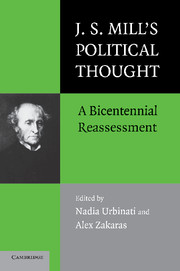Book contents
- Frontmatter
- Contents
- List of Contributors
- Introduction
- PART ONE LIBERTY AND ITS LIMITS
- PART TWO DEMOCRACY AND THE INDIVIDUAL
- 6 Bureaucracy, Democracy, Liberty: Some Unanswered Questions in Mill's Politics
- 7 Mill in Parliament: When Should a Philosopher Compromise?
- 8 John Stuart Mill, Individuality, and Participatory Democracy
- 9 Mill's Neo-Athenian Model of Liberal Democracy
- 10 John Stuart Mill on Education and Democracy
- PART THREE BEYOND NATIONAL BORDERS
- Bibliography
- Index
6 - Bureaucracy, Democracy, Liberty: Some Unanswered Questions in Mill's Politics
Published online by Cambridge University Press: 08 January 2010
- Frontmatter
- Contents
- List of Contributors
- Introduction
- PART ONE LIBERTY AND ITS LIMITS
- PART TWO DEMOCRACY AND THE INDIVIDUAL
- 6 Bureaucracy, Democracy, Liberty: Some Unanswered Questions in Mill's Politics
- 7 Mill in Parliament: When Should a Philosopher Compromise?
- 8 John Stuart Mill, Individuality, and Participatory Democracy
- 9 Mill's Neo-Athenian Model of Liberal Democracy
- 10 John Stuart Mill on Education and Democracy
- PART THREE BEYOND NATIONAL BORDERS
- Bibliography
- Index
Summary
Mill's Autobiography was intended to provide the reader with the authorized version of Mill's life. It was the life of the John Stuart Mill who had been born the son of James Mill, author of The History of British India, and nobody whose interest lay in anything other than the education he had received first from his father and then from Mrs. Taylor was encouraged to read it. At the outset, Mill says: “The reader whom these things do not interest, has only himself to blame if he reads farther, and I do not desire any other indulgence from him than that of bearing in mind that for him these pages were not written” (CW I: 5). There are many reasons for lamenting Mill's preoccupation with paying his debts to his father and Harriet Taylor. On this occasion, my regret is that Mill was reluctant to unbutton himself about issues about which he might have changed his mind between his precocious youth and the years of retirement during which he published On Liberty, Considerations on Representative Government, and The Subjection of Women along with Utilitarianism, Auguste Comte and Positivism, and An Examination of Sir William Hamilton's Philosophy.
When writing about Mill's contribution to the development of utilitarian ethics, we might wish that he had said much more about the way his essays ‘Bentham,’ and ‘Whewell's Moral Philosophy’ together with the final chapter of A System of Logic, underlay or did not underlie Utilitarianism.
- Type
- Chapter
- Information
- J.S. Mill's Political ThoughtA Bicentennial Reassessment, pp. 147 - 165Publisher: Cambridge University PressPrint publication year: 2007
- 4
- Cited by



